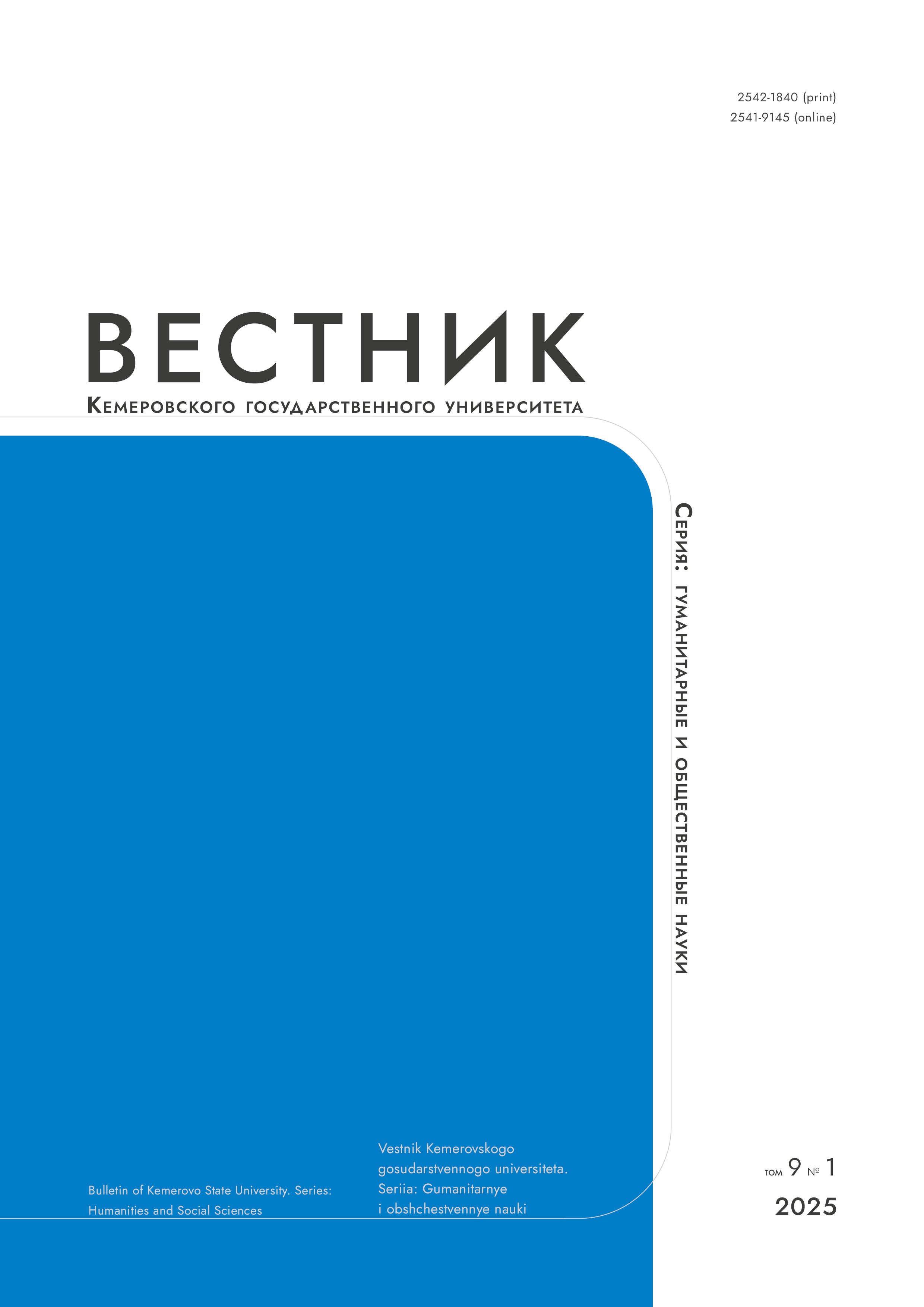Kemerovo, Russian Federation
UDC 10
The article deals with the socio-philosophical and cultural aspects of human activity in the conditions of forced interaction with information technologies and related socio-economic and psychological risks. On the one hand, there is a need to develop an information culture as one of the essential elements of the communicative interaction between various subjects of information space. On the other hand, ethnonational and other risks should be minimized, including the current situation of modern information diversity. The development of information technologies triggers new forms of criminal behavior, which shape a symbolic image of violence through manipulation and propaganda. The effectiveness of Internet crime prevention depends not only on the timeliness of the adoption of relevant legal acts, but also on the prompt response by state and law enforcement agencies to criminal activities in the information space. The new information infrastructure should be human-centered and aimed at realizing human potential and needs in order to improve the quality of life.
information culture, identity, information infrastructure, behavioral stereotype, digital discrimination
1. Gritskevich T. I. Modern reforms: manageability and epistemological uncertainty. Vestnik Novosibirskogo gosudarstvennogo universiteta. Seriia: Filosofiia, 2007, 5(1): 60-64. (In Russ.)
2. Zubov S. A. Financial results of Russian banks in January-August 2020. Monitoring ekonomicheskoi situatsii v Rossii: tendentsii i vyzovy sotsialno-ekonomicheskogo razvitia, 2020, (25): 12-19. (In Russ.)
3. Shabatura L. N., Yatsevich O. E. Cultural peculiarities of Russian labor activity. Humanities and Social Sciences, 2014, (2): 156-162. (In Russ.)
4. Akhiezer A. S. Philosophical foundations of socio-cultural theory and methodology. Voprosy Filosofii, 2000, (9): 29-45. (In Russ.)
5. Kierkegaard S. Fear and trembling. Moscow: Respublika, 1993, 383. (In Russ.)
6. Levashenko A. D., Magomedova O. S. Risks of digital discrimination in the context of COVID-19. Monitoring ekonomicheskoi situatsii v Rossii: tendentsii i vyzovy sotsialno-ekonomicheskogo razvitia, 2020, (21): 23-27. (In Russ.)
7. Piatigorskii A. M. One lane philosophy. Moscow: Progress, 1992, 155. (In Russ.)
8. Abdrakhmanova G. I., Vishnevskiy K. O., Gokhberg L. M., Demidkina O. V., Demianova A. V., Dranev Yu. Ya., Kovaleva G. G., Kotsemir M. N., Kuznetsova I. A., Kuchin I. I., Lola I. S., Ozerova O. K., Ostapkovich G. V., Ratay T. V., Ryzhikova Z. A., Streltsova E. A., Suslov A. B., Turovets Yu. V., Utyatina K. E., Fridlyanova S. Yu., Fursov K. S., Schugal N. B. Digital economy indicators in the Russian Federation: 2020. Moscow: NIU VShE, 360. (In Russ.)
9. Astashova N. D., Bobkova T. V. Symbolic universe of the digital economy. Filosofiia khoziaistva, 2020, (5): 11-26. (In Russ.)
10. Akhremenko A. S., Stukal D. K., Petrov A. P. Network vs message in protest diffusion on social media: theoretical and data analytics perspectives. Polis. Politicheskie issledovaniia, 2020, (2): 73-91. (In Russ.) DOI:https://doi.org/10.17976/jpps/2020.02.06
11. Zolotukhin V., Zolotukhina N., Sedina N., Kozyreva M. Socio-cultural and legal aspects of interaction between representatives of different subcultures in the media space. Fourth International Scientific Conference Communication Trends in the Post-literacy Era: Multilingualism, Multimodality, Multiculturalism, 2020, 227-234. DOI:https://doi.org/10.18502/kss.v4i2.6338
12. Shchekoturov A. V., Krishtal M. I. (Re)constructing the meanings of a political act using the social network Vkontakte: the case of Ivan Golunov. Mir Rossii. Sotsiologiia. Etnologiia, 2020, 29(4): 150-170. (In Russ.) DOI:https://doi.org/10.17323/1811-038X-2020-29-4-150-170
13. Ryzhova S. V. All-Russian national identity on the Orthodox-Islamic borders. Sotsiologicheskie issledovaniya, 2020, (8): 51-61. (In Russ.) DOI:https://doi.org/10.31857/S013216250010566-5
14. Zhukova O. I., Zhukov V. D. Religious consciousness as a factor in modern human culture. Vestnik Kemerovskogo gosudarstvennogo universiteta kul’tury i iskusstv, 2017, (39): 13-18. (In Russ.)
15. Malkki L. Political elements in post-Columbine school shootings in Europe and North America. Terrorism and Political Violence, 2014, 26(1): 185-210. DOI:https://doi.org/10.1080/09546553.2014.849933
16. Sukhodolskaya Yu. V. Schoolshooting as an independent criminological phenomenon. Vestnik Universiteta prokuratury Rossiĭskoĭ Federatsii, 2020, (3): 117-120. (In Russ.)
17. Minaev B. Coming out of the basement. Druzhba narodov, 2020, (8). Available at: https://magazines.gorky.media/druzhba/2020/8/vyjdya-iz-podvala.html (accessed 02.11.2020). (In Russ.)
18. Vehov V. B., Pastukhov P. S. New strategies of investigation of crimes based on the provisions of electronic criminalistics. Ex jure, 2019, (4): 129-141. (In Russ.) DOI:https://doi.org/10.17072/2619-0648-2019-4-129-141
19. Marinkin D. N., Kostareva V. A. Digital proofs in criminal trial. Journal of the Perm Institute of the FPS of Russia, 2019, (1): 33-36. (In Russ.)
20. Kozyreva M. V., Mahalov M. S. Concepts of culture in the context of quality of life. Vestnik Kemerovskogo gosudarstvennogo universiteta, 2015, (2-4): 210-213. (In Russ.)
21. Begtin I., Bertyakov A., Komin M., Parkhimovich O., Tsygankov M. Evaluation of the openness of state information systems in Russia. Moscow: TsPUR, 2020, 125. (In Russ.)
22. Asmolov A. G., Soldatova G. U., Maleva T. M., Sorokina S. S., Aldoshina T. L. Cross-cultural monitoring images of infogenie and pandemics. Can a political leader transcend the cultural matrix? Monitoring ekonomicheskoi situatsii v Rossii: tendentsii i vyzovy sotsialno-ekonomicheskogo razvitia, 2020, (10): 138-149. (In Russ.)
23. Ellul J. Psychological effects of propaganda. Communications. Media. Design, 2020, 5(1): 157-200. (In Russ.)
24. Petkova T. A., Skorobogackij V. V. Synergistic nature of human capital as a factor of effective management. Management Issues, 2018, (5): 151-157. (In Russ.)
25. Haken H. Self-organizing society. Synergetic paradigm. Social synergy, eds. and comps. Astafieva O. N., Budanov V. G. Moscow: Progress-traditsiia, 2009, 350-369. (In Russ.)
26. Akhmadullin I. R. Prospects for the work-to-rule strikes in Russia. Sotsiologicheskie issledovaniya, 2020, (10): 95-105. (In Russ.) DOI:https://doi.org/10.31857/S013216250009284-5
27. Sergeeva O. V. The influence of digitalization on regulating precontractual relations in private international law. Pravo. Zhurnal Vysshey Shkoly Ekonomiki, 2020, (3): 162-184. (In Russ.) DOI:https://doi.org/10.17323/2072-8166.2020.3.162.184
28. Romashkina G. F., Davydenko V. A., Andrianova E. V., Khudyakova M. V,. Pecherkina I. F. Human capital study: experience of empirical testing of complex tools. Siberian Socium, 2020, 4(3): 8-32. (In Russ.) DOI:https://doi.org/10.21684/2587-8484-2020-4-3-8-32



















